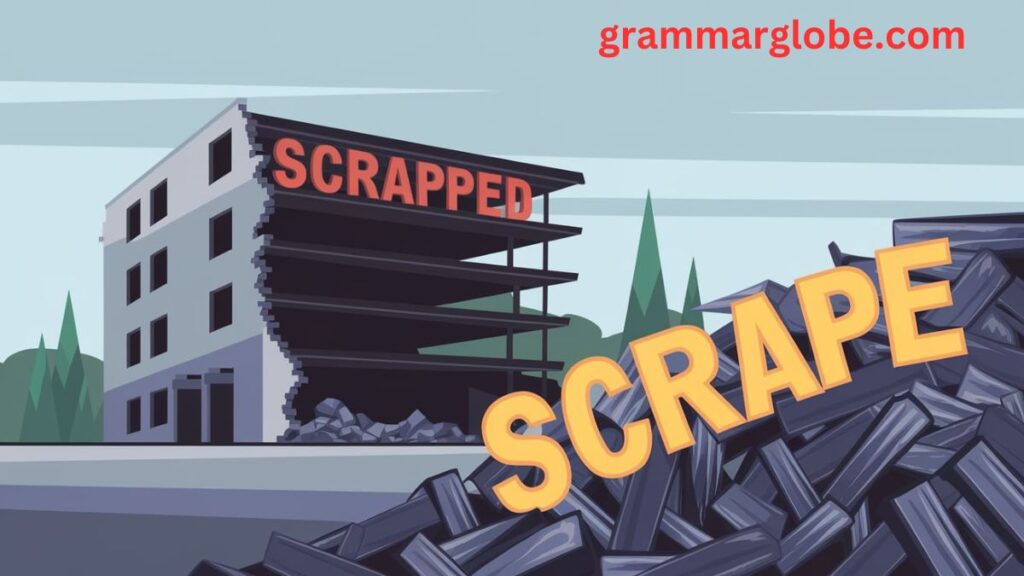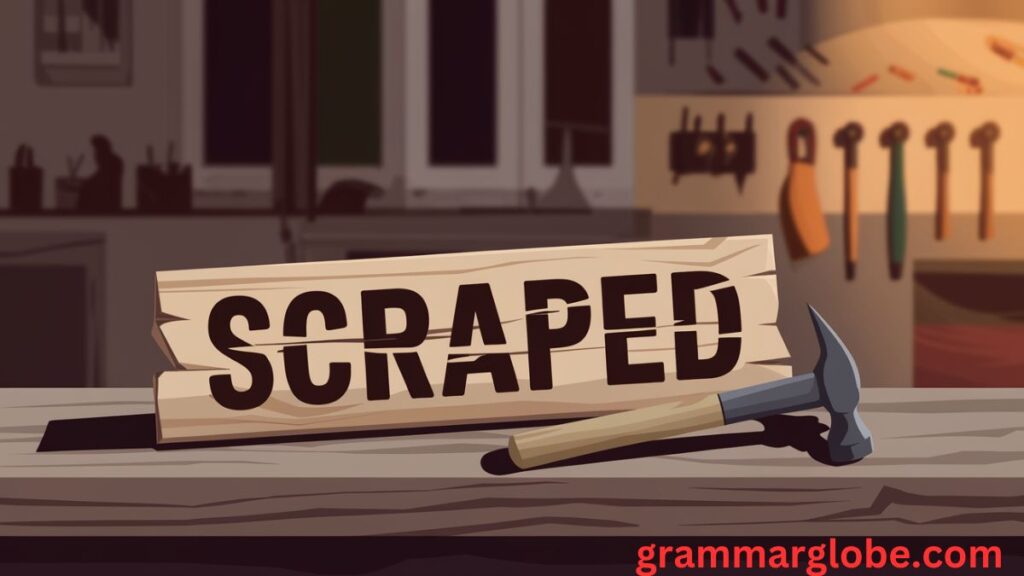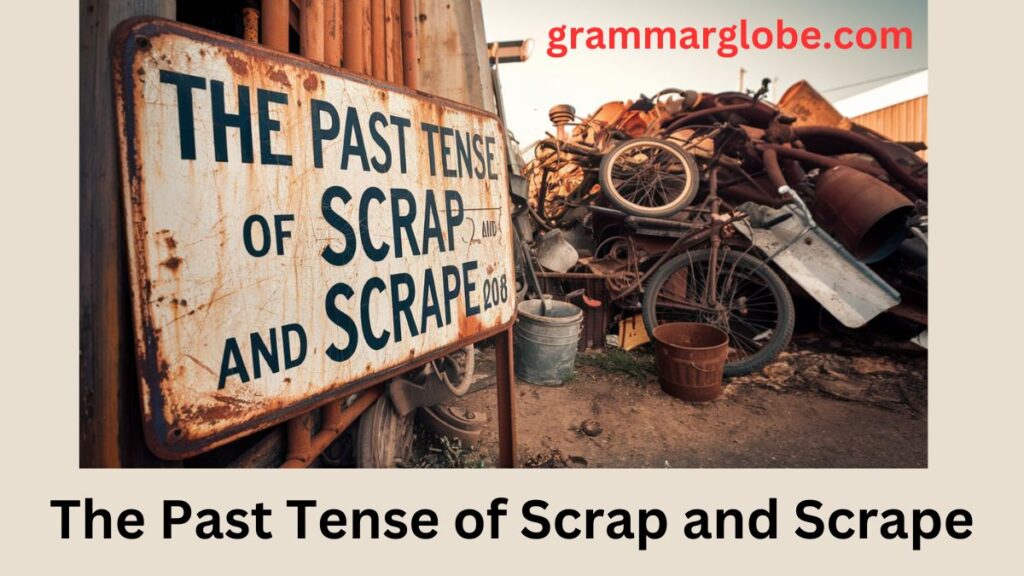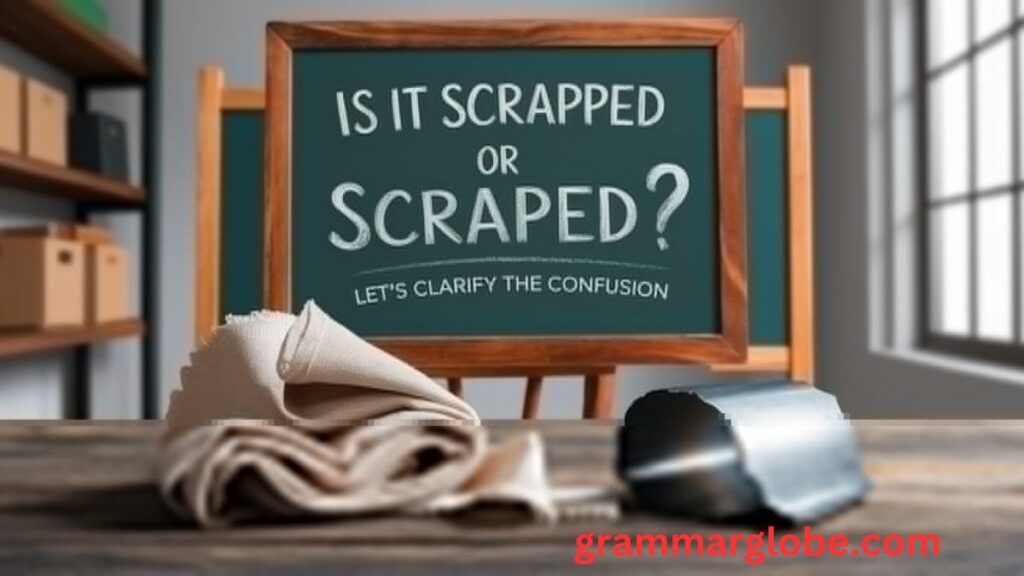The English language can sometimes feel like a maze of confusing rules, homophones, and tricky word choices. One common source of confusion is the words scrapped and scraped. While they might sound similar, they actually have very different meanings and uses. If you’ve ever been uncertain about whether to use scrapped or scraped, you’re not alone.
This article will clarify the distinction between these two terms, explaining their meanings, uses, and the differences between them. We’ll also dive into their etymology, how they evolved over time, and offer plenty of examples to make sure you never mix them up again.
Understanding the differences between scrapped and scraped is essential for anyone looking to communicate clearly and accurately in both written and spoken forms. By the end of this article, you’ll have a thorough grasp of when to use each word and feel confident in your language skills.
What Does Scrapped Mean?
The verb scrapped refers to the act of discarding, abandoning, or terminating something because it is no longer useful, relevant, or needed. This term is commonly used in business, project management, and even in personal contexts to indicate that something has been rejected or canceled. To scrap something is to get rid of it, either physically or figuratively.
When you scrap something, you decide it no longer has value or purpose. Often, this is after considerable time and effort have been invested in it, which can make the decision to scrap particularly significant.

Examples:
- “The company scrapped the new product line due to unforeseen market conditions.”
- “After much debate, the committee scrapped the proposed budget plan.”
In both cases, scrapped refers to the act of abandoning something — whether a product, idea, or plan — because it is no longer viable or useful.
Origins of Scrapped
The origin of the word scrap can be traced back to the Old French word “escrap,” which meant a small fragment or piece of something. The word evolved into the verb scrap in English, which eventually took on the meaning of discarding or abandoning something deemed no longer useful. Over time, this expanded to include more figurative uses, such as canceling projects, plans, or even relationships.
Interestingly, scrap originally referred to small fragments of material, and its connection to scrapped projects and plans reflects the discarding of ideas or actions that are no longer considered valuable.
Origins of Scrapped
The term scrapped has a fascinating history that stretches back through several centuries and languages. Its roots lie in the word “scrap,” which originally referred to small pieces or fragments of something. To understand scrapped fully, we need to delve into both the etymology of scrap and how it transformed into the verb “scrap” and later “scrapped.”
Etymology of “Scrap”
The word scrap itself can be traced back to the Middle English term “scrap,” which came from the Old French “escrap” or “scrap,” meaning a small portion, fragment, or waste. This French word, in turn, originated from the Latin word “scrappus” or “scrappus,” referring to a fragment or a piece of something broken off.
In its early uses, scrap had a fairly neutral or descriptive meaning, simply referring to small, leftover pieces of material—be it paper, metal, cloth, or other items. Over time, however, scrap began to take on a negative connotation, specifically related to material or items deemed unnecessary, broken, or not valuable. This shift in meaning paved the way for the verb “scrap”, which referred to the action of discarding, abandoning, or getting rid of something.
The Verb “Scrap” and “Scrapped”
The verb “scrap” first appeared in English around the early 17th century, primarily in reference to the act of discarding or abandoning things, especially when they were no longer useful. This verb usage grew in popularity, especially in industrial and business contexts, where it was commonly associated with the act of discarding waste materials like metal, wood, or paper.
The evolution of scrap into scrapped followed a natural path as the verb form became more widely used. Over time, scrapped came to mean the abandoning of ideas, projects, plans, or even entire business ventures. In this sense, it went beyond just physical material waste to also describe the figurative act of deciding that something was no longer worth pursuing or keeping.
The Shift in Meaning Over Time
By the 19th and 20th centuries, the word scrapped became heavily associated with project abandonment and the cancelation of plans. This was largely due to industrialization and the waste management practices that emerged during that period, where businesses and factories had to deal with large amounts of discarded or unused materials.
The figurative use of the word expanded as businesses, companies, and even governments started using scrapped plans or scrapped projects to describe initiatives that were either unsuccessful or deemed not worth continuing. This was particularly common in areas like engineering, manufacturing, and large-scale infrastructure projects, where the term was often used to describe plans that were halted or thrown away before they could be completed.
Examples of Early Usage
- Scrapping projects: Early use of scrapping involved the discarding of materials or ideas in a manufacturing context. For example, in the early 1900s, a company might have “scrapped” a batch of defective metal parts that couldn’t be used for production.
- Scrapped plans: In the business world, scrapped started being used to describe abandoned projects. For example, during wartime, governments might scrap plans for certain projects due to shifts in priorities or changing political climates.
Modern Usage
Today, scrapped is commonly used to refer to anything that has been discarded, abandoned, or canceled, both literally and figuratively. In everyday usage, you might hear people say things like:
- “They scrapped their weekend plans because of the weather.”
- “The company scrapped its expansion plans after a downturn in the market.”
This broader use of scrapped continues to evolve, especially in a business context, where it regularly refers to things like canceled projects, discontinued product lines, or even scrapped ideas that no longer fit within the company’s long-term strategy.
In short, the word scrapped has evolved from a simple term for small, discarded pieces to a powerful verb used to describe the abandonment of projects, ideas, and plans. Its usage today spans many contexts, from the literal removal of materials to the figurative abandonment of business ventures, and its origins in both the physical and figurative realm continue to shape how we use it today.
Scrapped in Different Contexts
Business Context
In business, the word scrapped is often used to describe the decision to abandon a project or discontinue a plan. It can be part of a cost-cutting measure or simply a strategic decision based on new information or changing market conditions.
- “After extensive testing, the software company scrapped its initial version due to user feedback.”
- “The team scrapped the expansion plans due to financial constraints.”
Everyday Context
On a personal level, scrapped can refer to canceling or giving up on plans. For example, you might scrap a weekend trip if unexpected events arise.
- “We scrapped our dinner reservation because of the bad weather.”
- “Due to the unexpected emergency, I had to scrap my workout plans.”
What Does Scraped Mean?
In contrast, scraped refers to the physical act of removing material from a surface, typically using a scraping tool or by applying a physical force. When you scrape something, you are usually rubbing or scratching the surface to remove something that is stuck, unwanted, or unnecessary. The word scraped is primarily used in contexts involving physical action — whether cleaning, smoothing, or material removal from a surface.

Examples:
- “He scraped the ice off the windshield of his car.”
- “She scraped the old paint off the wooden chair to refurbish it.”
Here, scraped refers to the physical action of removing layers or material from a surface.
Origins of Scraped
The verb scrape comes from the Old French word “escraper,” which means “to scrape or scratch.” Its origins in the late Middle Ages reveal a connection to physical cleaning or abrasion. Over time, the word evolved to describe the act of scraping off material, whether it be ice, paint, or other surface grime.
In modern usage, scraped is applied to many tasks where material is removed from a surface using tools or physical exertion. The act is typically very hands-on, involving abrasion or scrubbing.
Scraping in Different Contexts
Cleaning and Surface Grime Removal
In day-to-day life, we scrape things like ice off our car windows, grime off kitchen counters, or rust off old furniture. The verb is usually applied to cleaning actions or to removing unwanted material.
- “I scraped the dried mud off my shoes.”
- “He scraped the rust off the metal railing before painting it.”
Industrial Context
In industrial contexts, scraping is often used to remove excess material from machines or surfaces in manufacturing. This could involve scraping off excess paint, debris, or even metal filings.
- “The factory used a scraper to remove the excess material from the machinery.”
- “The workers used sandpaper to scrape the rough edges off the metal parts.”
While scrapped and scraped may sound similar, their meanings and uses are distinct. Here’s a detailed comparison of the two words:
| Term | Definition | Context | Example |
|---|---|---|---|
| Scrapped | Discarded, abandoned, or canceled | Often used in business contexts or for abandoned projects | “The team scrapped the idea after poor feedback.” |
| Scraped | Removed material physically from a surface | Used for physical cleaning, surface cleaning, or material removal | “She scraped the paint off the table.” |
Key Differences:
- Scrapped refers to abandoning or discarding something, often in a figurative or business context.
- Scraped involves the physical act of removing material from a surface, whether by using a tool or rubbing/scratching.
Contextual Use of Scrapped
Business and Project Abandonment
In business settings, the word scrapped is most often used to refer to the abandonment or discontinuation of plans. When a project or plan is scrapped, it is no longer pursued due to changing circumstances or a reevaluation of its viability.
- “After careful consideration, the company scrapped its expansion project.”
- “They scrapped the marketing strategy after realizing it wasn’t achieving the desired results.”

Personal Context
In everyday situations, you might use scrapped when you cancel or abandon plans, whether related to personal events or larger commitments.
- “Due to the bad weather, we scrapped our plans for a road trip.”
- “The team scrapped their weekend getaway plans after one of the members fell ill.”
Contextual Use of Scraped
Surface Cleaning
In contrast, scraped refers to the physical action of removing layers or unwanted material from a surface. This could involve cleaning, refurbishing, or material removal.
- “He scraped the ice off the windshield before driving.”
- “She scraped the paint from the old chair to prepare it for a new coat.”
Industrial and Commercial Context
In an industrial or commercial setting, scraping refers to the removal of layers from various surfaces to prepare them for further use or to clean them.
- “The workers used a scraper to scrape off the excess material from the metal plates.”
- “The machine scraped off the coating from the raw materials in the factory.”
Synonyms for Scrapped and Scraped
Understanding the synonyms for both words can also help reinforce their meanings and appropriate usage.
Synonyms for Scrapped:
- Abandoned
- Discarded
- Canceled
- Reversed
- Rejected
- Terminated
Synonyms for Scraped:
- Removed
- Shaved
- Scoured
- Cleared
- Scrubbed
- Polished
The Past Tense of Scrap and Scrape
Both scrap and scrape form their past tense by adding the suffix “-ed,” producing scrapped and scraped, respectively. However, the actions and contexts in which they are used are different.
- Scrapped refers to abandoning or discarding something.
- Scraped refers to the physical action of removing material from a surface.

Cleaning Surfaces and Scraping Off Layers
Cleaning tasks often require scraping, whether it’s to remove paint, dirt, or ice from a surface. Scraping is essential in everyday life, especially during the winter months when scraping ice off car windshields becomes a daily task.
Tools Used for Scraping
- Scrapers (metal or plastic)
- Razor blades
- Sandpaper
- Brushes
These tools help facilitate the material removal process, making it easier to clean or refurbish surfaces effectively.
Final Thoughts: Scrapped or Scraped?
The confusion between scrapped and scraped is common, but with a clear understanding of their meanings and contexts, you can use both words confidently and correctly. Remember that scrapped refers to abandoning something — whether a project, plan, or idea — while scraped involves the physical removal of material from a surface.
By paying attention to these nuances, you can avoid confusion and improve your communication skills. Now that you know the difference between scrapped and scraped, you can confidently incorporate these words into your writing and conversation, ensuring clarity and precision in your language use.
Related Posts:
- List of All Types of Shapes Names with Images
- 22 Good Roasts That Hurt and Rhyme: Guide to severe Burns!
- 29 Ways to Say “Thank You for Your Attention” in an Email

Irha Queen, a talented writer at grammarglobe.com, specializes in crafting witty puns and exploring the intricacies of English grammar. Her playful yet informative style makes language learning fun, blending humor with clear explanations to engage readers of all levels. Whether she’s spinning clever wordplay or breaking down complex grammar rules, Irha’s content is both entertaining and educational, making her a favorite among language enthusiasts.






